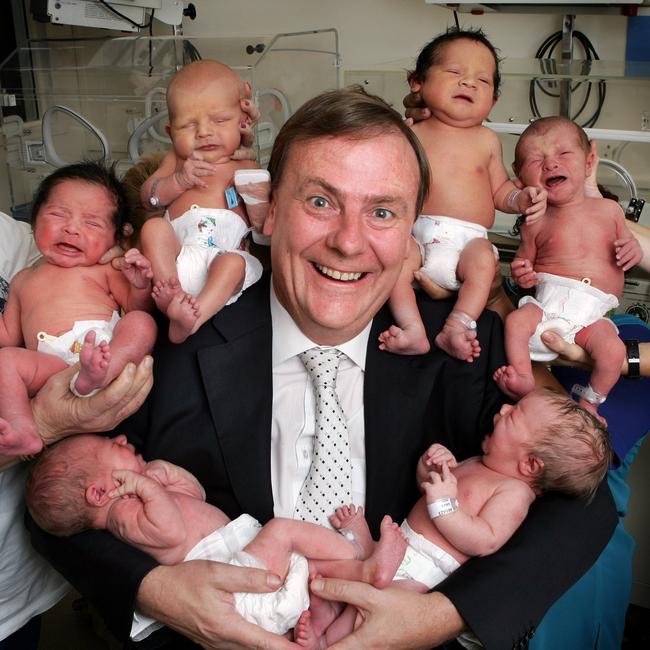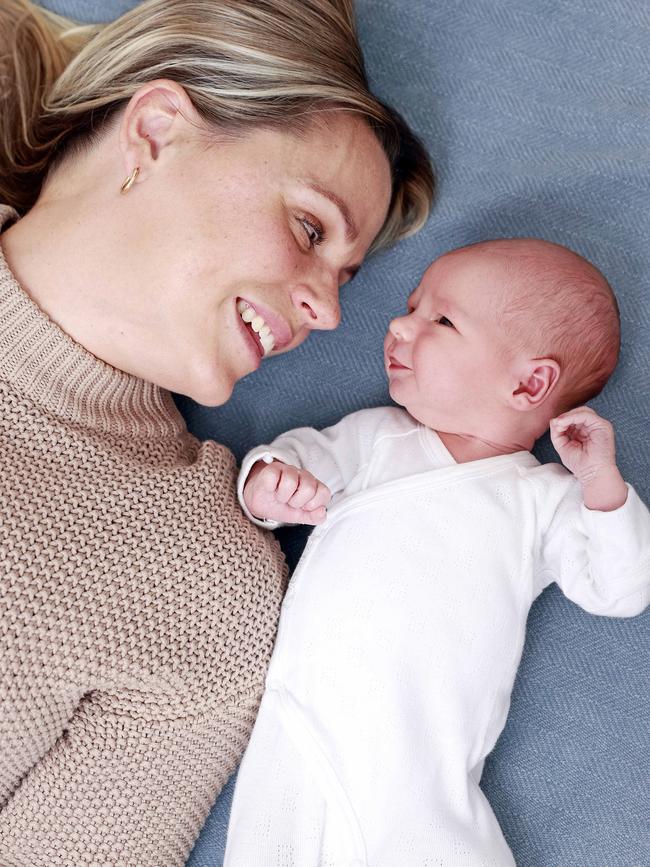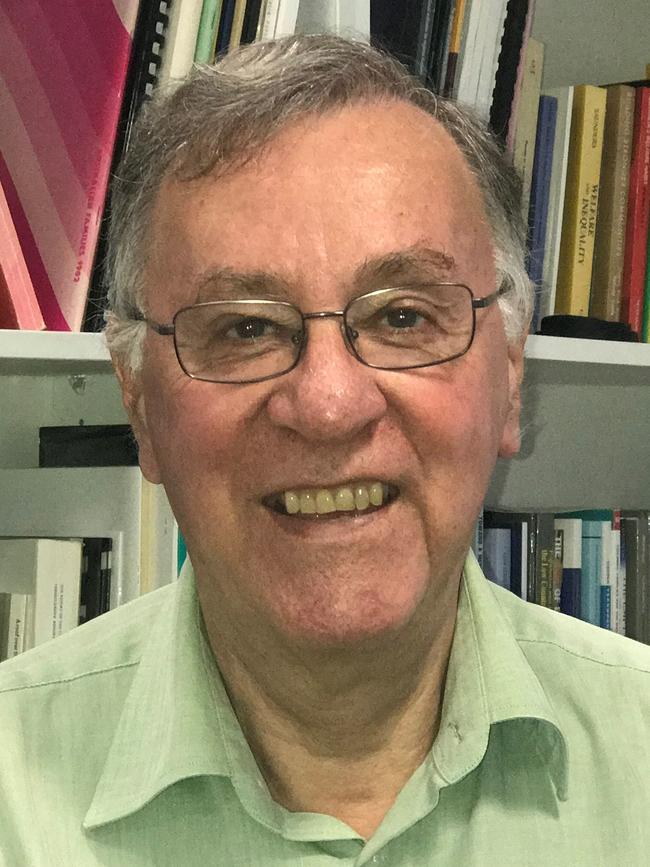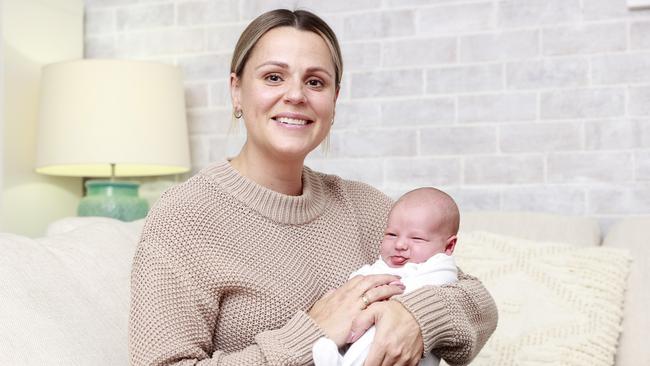Peter Costello says more babies — not immigration — is what Australia needs
His baby bonus was credited with boosting Australia’s flagging birthrate two decades ago, now Peter Costello is back, urging people to procreate for the good of the nation.
NSW
Don't miss out on the headlines from NSW. Followed categories will be added to My News.
Peter Costello, the only politician to have persuaded Australians to have more kids, has a blunt warning: We can’t solve our workforce shortages through the “Ponzi scheme” of immigration.
Next year marks 20 years since Mr Costello introduced a $3000 baby bonus, telling us if we wanted to fix the “ageing demographic” we “should have one for the father, one for the mother and one for the country”.
While the policy is credited with turning Australia’s birthrate around, things are back to where they were.
When Mr Costello introduced the baby bonus in 2004, Australia’s total fertility rate (TFR) was just below 1.78. In the next four years it rose to 2.02, the highest level it had been since the mid-1970s and nudging the replacement rate of 2.1.
But it was a false dawn.

Though the TFR has recovered back to 1.7 after hitting its lowest ever level during Covid, it’s still lower than where it was when the baby bonus came in.
“Fertility is lower now,” Mr Costello said. “I think we took our eye off this. We’ve let the issue drop.”
In part he blames migration.
“People have been convinced that you can make this up through migration, but migration doesn’t deal with an ageing population,” he said.
“The only thing that deals with an ageing population is increasing the birthrate.”
The decline of Australia’s birthrate in recent years is part of a global phenomenon.
According to Professor Peter McDonald from Melbourne University, the decline in the birthrates in the developed world can be seen as part of a trend that has been going since industrialisation began in the 19th century.

By the 1990s, when this numbers had fallen well below replacement levels, governments around the world were, like Mr Costello, grappling with ways to get people to have more children.
“The view was that most women wanted to have two children, but lack of support for the combination of work and family in southern European countries, German-speaking countries and wealthy East Asian countries prevented them from having two,” he said.
“So the recommended policy approach was for governments to spend much more on work-family supports.
“I was one of the strongest advocates of these policies. And there were some successes – Quebec in Canada, Germany.”
This approach, he said, “is now subject to some doubt because it has become evident that fertility is falling again”.
Professor Nick Parr of Macquarie University agrees.
“In the last decade or so we’ve been the birthrates coming down there and in some cases it’s really been quite a steep drop,” he said.

While 50 per cent of women still have two or more children, there are increasing numbers who are only having one child or, in many cases, none.
Between the 2016 and 2021 census there were large increases in the percentages of women aged between 25 to 29 and 30 to 34 who were childless — more than 5 per cent in each category.
Prof Parr, a demographer, said these increases had taken him by surprise.
“I was expecting a more a gradual pattern of change,” he said.
“It could be the age pattern for having children is changing radically or it could be a portent of a new pattern of lifelong childlessness.”
He said we would not know the answer to this for a while. While many of these women would eventually end up having children, others would not, for many reasons.
Prof McDonald said it is “probably best explained in terms of perceptions of high levels of gender inequity in most aspects of society,” as well as the increase in the percentage of women opting to have no children.
“Dealing with this from a policy perspective is not straightforward,” he said.
For Mr Costello, the most important thing is that governments start talking about the problem.
“It’s not really the mechanism – what is important is that the government puts this on the agenda as an issue,” he said. “I did it through the baby bonus. But it’s not the baby bonus itself that makes the difference.
“The difference is when the government talks about it as a serious issue, talks about the risks that we’re running through an ageing population, and the need to boost natural increase.
“That’s what makes the difference.”

Mr Costello said government has a role to play in tackling anti-child ideology.
“I think the view has got around that having children is somehow bad for the environment or whatever,” he said.
“I think you’ve got to talk to people about how it’s actually a very good thing for society and how we need them.”
Building confidence in the future is also important.
“I think people do feel insecure at the moment. And I think economic security and confidence about the future is a very big part of it,” he said.
Instead, “the government’s trying to cover this with immigration, but immigration is sort of like a Ponzi scheme – you’ve got to keep the immigration going”.
“I don’t think we can sustain 400,000 people a year.
“Our infrastructure’s already overstretched and we have a housing shortage,” he said.
“It’s very obvious why there’s a shortage of houses. Very obvious.
“But no one wants to say that because as you know once you say the immigration program should be moderated, you get all sorts of people accusing you of all sorts of things.”
‘A BONUS WOULD BE HELPFUL’
For young parents Amy Sliney and Jason Crannage, a Costello-era baby bonus would make a world of difference in their lives.
The pair welcomed their new — and very expensive — bundle of joy Hazel into the world last week, and said the decision took a lot of financial planning and sacrifice.

“It would be a huge difference if we were able to get extra money for having babies and starting our families, especially for first-time parents who have no idea what the cost is going to be,” Mrs Crannage said.
“With the current cost of living crisis, we are never really able to get ourselves ahead.”
The pair are currently living with their parents, in order to save money.
Mrs Crannage said many young families were choosing to delay having children due to the rising cost of living.
“I know many people who have delayed having kids so they can try and buy a property before they have a kid. It’s something on their mind.
“It’s not a simple decision to just have kids whenever you want, there’s a lot more planning that goes into it, and accepting you won’t be able to do the same things we did as kids,” she said.
Got a news tip? Email weekendtele@news.com.au





